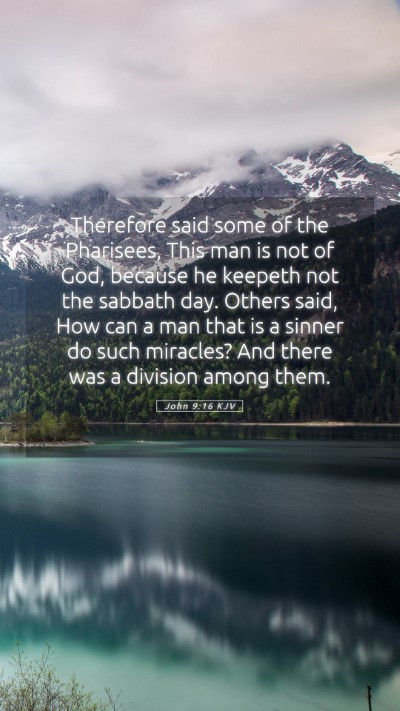Bible Verse Interpretation: John 9:16
Verse: John 9:16 - "Therefore said some of the Pharisees, This man is not of God, because he keepeth not the sabbath day. Others said, How can a man that is a sinner do such miracles? And there was a division among them."
Overview of John 9:16
In this verse, we encounter a critical moment in the Gospel of John where Jesus heals a man born blind, an act that creates a significant theological conflict among the Pharisees. The verse highlights two contrasting responses to Jesus' miraculous work and sets the stage for ongoing debates about His identity and authority.
Bible Verse Meanings and Interpretations
- Conflict with Religious Authority: Jesus' healing on the Sabbath challenges traditional interpretations of the Law. The Pharisees, who were the religious leaders, struggled to reconcile their strict observance of the Sabbath with the compassion and power demonstrated by Jesus.
- Division and Disagreement: The phrase "there was a division among them" indicates that Jesus’ actions prompted a significant conflict. This division emphasizes the clash between the old covenant understanding of the Law and the new covenant of grace and love introduced by Jesus.
- Miracles and Sinners: Some Pharisees questioned how someone who does not adhere to the Law (according to their interpretation) could perform miracles, raising a crucial point for further discussion on the righteousness of Jesus and the nature of sin.
- Jesus’ Authority: The confrontation showcases the authority of Jesus against established religious norms, implicating His divinity and the need for a paradigm shift in understanding God's work in the world.
Commentary Insights
Matthew Henry's Commentary: Henry emphasizes that the healing on the Sabbath is not merely an act of compassion but a declaration of Jesus' position as Lord over the Sabbath. He comments on the inconsistency of the Pharisees, noting that their reliance on the law without compassion leads to spiritual blindness.
Albert Barnes' Commentary: Barnes focuses on the nature of the division among the Pharisees, highlighting that even within the religious elite, there were conflicting opinions about Jesus. This suggests that the truth of Jesus’ identity transcends human traditions and interpretations of the law.
Adam Clarke's Commentary: Clarke notes the irony in the verse, whereby the very institution that claims to know God is blind to His workings. He argues that this illustrates the broader theme of blindness versus sight in the Gospel of John, where physical healings signify deeper spiritual truths.
Understanding Scripture in Context
This verse is set within a narrative that not only concerns physical healing but also spiritual enlightenment. The act of healing represents Jesus' mission to offer sight to the spiritually blind, and the response it evokes highlights the struggle people have in understanding divine truths that defy their expectations.
Cross References
- Exodus 20:8-11: The commandment regarding the Sabbath and its observance.
- Matthew 12:1-14: Jesus teaches on the Lord of the Sabbath and the value of mercy over sacrifice.
- John 5:16-18: Similar confrontation regarding Jesus’ healing on the Sabbath, where He clarifies His divine status.
- Mark 2:27: Jesus states that the Sabbath was made for man, not man for the Sabbath.
Application of John 9:16
The application of this verse to modern life encourages believers to reflect on how they prioritize rules versus compassion and mercy. It challenges individuals and communities to seek understanding of Scripture that fosters love and grace rather than division and fear.
Understanding Difficult Bible Passages
For those grappling with the implications of Jesus’ actions and the responses they incite, this passage is an invitation to engage deeply with the character of God as revealed in Christ. This process is essential in honing one's Bible study insights and deepening one's understanding of Scripture.
Conclusion
John 9:16 calls for a thoughtful engagement with the text, prompting readers to consider the significance of Jesus’ miracles, the nature of divine authority, and the call to embrace a faith that transcends mere rules. Through studying verses like this, believers can enhance their Biblical exegesis, enriching their personal and communal Bible study experiences.


